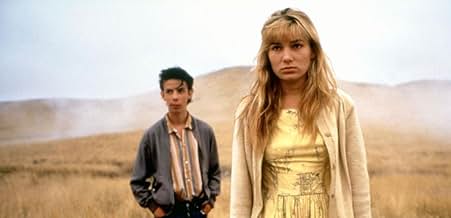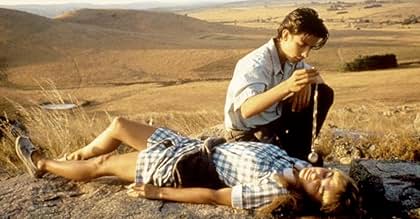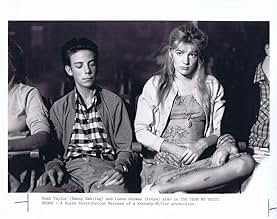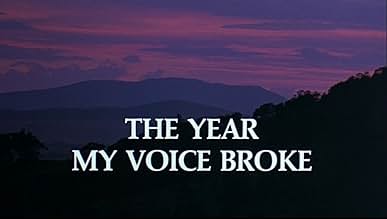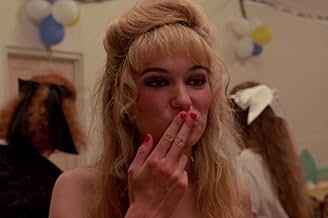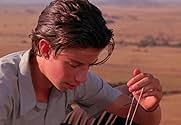IMDb RATING
7.3/10
2.4K
YOUR RATING
In rural 1960s Australia, a boy watches helplessly as his best friend falls in love with a small-time criminal, setting off a violent chain of events.In rural 1960s Australia, a boy watches helplessly as his best friend falls in love with a small-time criminal, setting off a violent chain of events.In rural 1960s Australia, a boy watches helplessly as his best friend falls in love with a small-time criminal, setting off a violent chain of events.
- Awards
- 6 wins & 4 nominations total
- Director
- Writer
- All cast & crew
- Production, box office & more at IMDbPro
Featured reviews
John Duigan's The Year My Voice Broke stands out from other coming of age films because of its simple honesty and natural performances. Gorgeously photographed in Braidwood, New South Wales, Australia, the film avoids the usual "rites of passage" cliches and makes real the heartbreak of awakening sexuality and feeling alone. Set in 1962, Danny Embling (Noah Taylor) is a sensitive, scrawny 15-year old who is obsessed with his childhood friend, 16-year old Freya Olson (Leona Carmen).
He writes poetry and tries to emulate rock stars to win her over but his voice is always breaking when he tries to sing. Freya, orphaned as a baby and now something of a wild spirit, shares her secrets with Danny in their private place on the nearby rocky crags. Both teens feel isolated, Danny from the macho attitudes of his schoolmates and Freya because of the truth she senses about her mother.
Freya is increasingly attracted to Trevor (Ben Mendelsohn), a rugby player who is given to petty crime. Though the mood grows dark, Duigan uses humor to lighten things up when Danny attempts to hypnotize Freya into loving him, and when the boy tries mental telepathy to prevent Freya from kissing Trevor. Danny's loneliness is painfully evident when he tags along with Freya and Trevor on a date and has to endure the agony of watching them make love at a "haunted house". This house plays a significant part in Danny, Freya, and Trevor's relationship and in the film's dramatic climax. Duigan ties his story to the dark secret of the town whose discovery will change the lives of the characters forever and leave you reflecting on the pain of growing up.
He writes poetry and tries to emulate rock stars to win her over but his voice is always breaking when he tries to sing. Freya, orphaned as a baby and now something of a wild spirit, shares her secrets with Danny in their private place on the nearby rocky crags. Both teens feel isolated, Danny from the macho attitudes of his schoolmates and Freya because of the truth she senses about her mother.
Freya is increasingly attracted to Trevor (Ben Mendelsohn), a rugby player who is given to petty crime. Though the mood grows dark, Duigan uses humor to lighten things up when Danny attempts to hypnotize Freya into loving him, and when the boy tries mental telepathy to prevent Freya from kissing Trevor. Danny's loneliness is painfully evident when he tags along with Freya and Trevor on a date and has to endure the agony of watching them make love at a "haunted house". This house plays a significant part in Danny, Freya, and Trevor's relationship and in the film's dramatic climax. Duigan ties his story to the dark secret of the town whose discovery will change the lives of the characters forever and leave you reflecting on the pain of growing up.
"The Year My Voice Broke" might be the best coming-of-age movie ever made in Australia. I'm unsure why it took me so long to watch it. I kind of expected it to be painful, and, you know, it was.
It does not have a happy ending. It's haunting and achingly beautiful. What you generally get from Australian movies that you don't get from Hollywood is truth. There's not a lot of sugar coating. And the characters feel believable as people who might actually exist, not broad archetypes we're all familiar with.
Take Danny, the main character, played by Noah Taylor, who played artistically inclined teenagers for at least another ten years (he was the young David Helfgott in "Shine"). If this movie were American, they'd probably make him a nerd, but Danny isn't a nerd. He's a poet, a musician, a singer. He's smarter than most of the people around him, he's socially awkward due to that depth of intelligence, but he's no "nerd". Like a real person, he is hard to categorise.
The same can be said for Freja, the girl he loves and has known his whole life. Even in the way Danny sees her, she's not your typical coming-of-age story's object of desire for the protagonist. In an American movie, she'd be like the exchange student in "American Pie", ie. Only ever glimpsed in terms of her sexuality. In "The Year My Voice Broke", she's so much more than that. She's too down to earth to be the elusive lust-object that girls like this typically are. Because Danny sees her as a person, and not as a lust object, we actually believe his love for her, and because Leone Carmen's performance is so good, we understand why he feels that way.
Nothing in "The Year My Voice Broke" is as it appears. The movie might evoke some standard plot devices, such as a love-triangle, but it all feels lived in and real. This is what makes it one of the best coming-of-age stories ever made.
It does not have a happy ending. It's haunting and achingly beautiful. What you generally get from Australian movies that you don't get from Hollywood is truth. There's not a lot of sugar coating. And the characters feel believable as people who might actually exist, not broad archetypes we're all familiar with.
Take Danny, the main character, played by Noah Taylor, who played artistically inclined teenagers for at least another ten years (he was the young David Helfgott in "Shine"). If this movie were American, they'd probably make him a nerd, but Danny isn't a nerd. He's a poet, a musician, a singer. He's smarter than most of the people around him, he's socially awkward due to that depth of intelligence, but he's no "nerd". Like a real person, he is hard to categorise.
The same can be said for Freja, the girl he loves and has known his whole life. Even in the way Danny sees her, she's not your typical coming-of-age story's object of desire for the protagonist. In an American movie, she'd be like the exchange student in "American Pie", ie. Only ever glimpsed in terms of her sexuality. In "The Year My Voice Broke", she's so much more than that. She's too down to earth to be the elusive lust-object that girls like this typically are. Because Danny sees her as a person, and not as a lust object, we actually believe his love for her, and because Leone Carmen's performance is so good, we understand why he feels that way.
Nothing in "The Year My Voice Broke" is as it appears. The movie might evoke some standard plot devices, such as a love-triangle, but it all feels lived in and real. This is what makes it one of the best coming-of-age stories ever made.
The Year My Voice Broke is the finest film to come from Australia.
The acting is wonderful, the scenery is glorious, the cinematography superb, and everything clicks to make for a very moving story. This is one of my all-time favorities of all movies every made. The young actors are very natural in their approach to acting and one feels they are very real people who are going through this strange change in life through which all must pass. Kudos to the director and the producers.
The acting is wonderful, the scenery is glorious, the cinematography superb, and everything clicks to make for a very moving story. This is one of my all-time favorities of all movies every made. The young actors are very natural in their approach to acting and one feels they are very real people who are going through this strange change in life through which all must pass. Kudos to the director and the producers.
The talented John Duigan (perhaps best known for directing WIDE SARGASSO SEA (1993), based on the novel by Jean Rhys) wrote and directed this wonderful film about kids growing up in New South Wales, Australia, in 1962. Four years later, with the same boy in the lead, Duigan directed its sequel, FLIRTING (1991). The film is so honest, straightforward, and heart-rending, that it is a model of what an unpretentious film about real people should be. The film was made in the small town of Braidwood, which apart from its cinema looks like something from 1862 rather than 1962, so things clearly didn't change much in those days in the area they call the 'Tableland'. The film would not have worked if the two leads had not been so perfect. Seventeen year-old Loene Carmen is so fresh and real as the girl Freya Olson, but also so convincingly sad and tragic in the light of the events which ensue. The kids in this film just don't seem to be acting. We can almost believe that John Duigan sneaked into the little town with an invisible camera and recorded all of this really happening. The boy Danny is played by Noah Taylor. The honesty and integrity of his performance were the key to its success. He languishes with hopeless love as an onlooker to the tragic first romance of his childhood friend, Freya, who being older than him is 'out of his league' romantically. The pain of first love, especially unrequited first love, is intensely conveyed. There is also the implicit undercurrent that Freya may be his own half-sister, with neither of them realizing it, as there is a subplot about the dead mother of Freya, Sarah Amery, who died having her at the age of only 17, and the father may well have been Danny's own. But this is all the invisible 'grownup background' to the story of the kids, who are in the foreground of this tale. Ben Mendelsohn plays an older boy with a maniacal laugh who steals Freya's heart but who turns out to be mentally unbalanced, presumably with incipient schizophrenic. Things turn out badly. There are wonderful shots of the wild Australia, and the kids run around in the fields and on the hills with the abandon of a youth before everything became spoiled by cell phones, emails, and Facebook. Everyone in those days was outdoors all the time, not hunched over a computer. People actually looked at one another as they passed in the street, and were not peering into their Blackberrys or staring into space with a piece of metal stuck in their ear like a transplant. This film is an ode to real life, in a world which has forgotten what real life is. It is one of the masterpieces of the high tide of Australian cinema back in those days before the tide broke.
I thoroughly enjoyed all of the film. The two young actors are well cast. What originally made the movie stand out for me was the sound track. I had never seen,or heard, a film that used the music of Vaughn Williams before. I was flicking channels one night when the music made me stop and I watched the rest of the film. I have watched it twice since. Gloomy, moving and fascinating.
Did you know
- TriviaThis picture was one of fifty Australian films selected for preservation as part of the National Film and Sound Archive of Australia's Kodak/Atlab Cinema Collection Restoration Project.
- GoofsWhen Danny and Freya stand on the line watching the train pass, the crew's image is reflected in the shiny side of the train carriages.
- Quotes
Danny Embling: Wanna dance?
Freya Olson: You know what, try one of them.
Danny Embling: Plenty of time.
Freya Olson: Good luck.
- SoundtracksThe Lark Ascending
Written by Ralph Vaughan Williams
Details
- Release date
- Country of origin
- Language
- Also known as
- Australian Graffiti
- Filming locations
- Braidwood, New South Wales, Australia(country town)
- Production company
- See more company credits at IMDbPro
Box office
- Gross US & Canada
- $213,901
- Opening weekend US & Canada
- $5,487
- Aug 28, 1988
- Gross worldwide
- $213,901
Contribute to this page
Suggest an edit or add missing content


